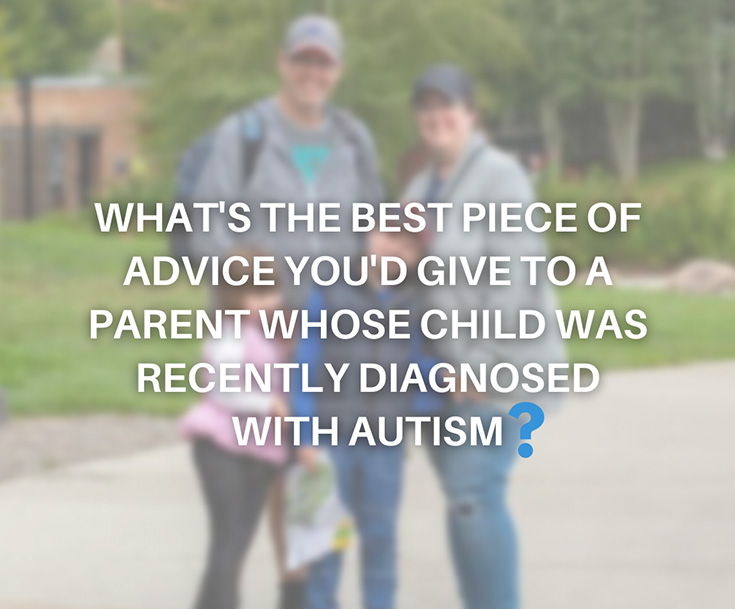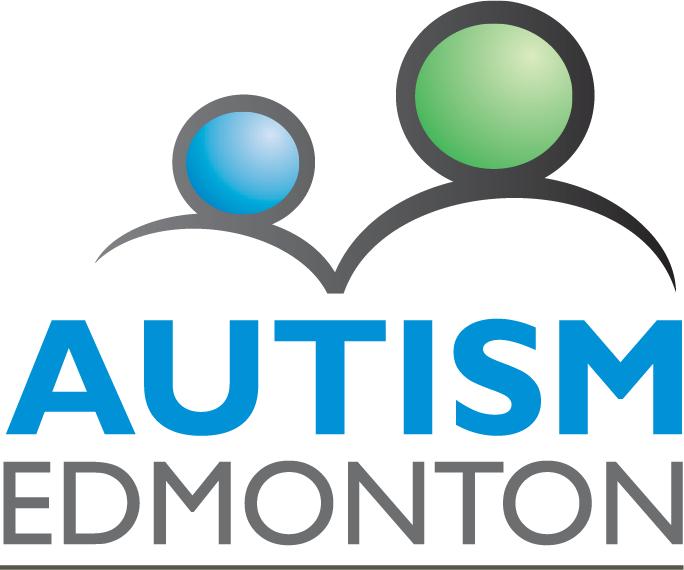
What’s the best piece of advice you’d give to a parent whose child was recently diagnosed with autism?
We posted that question on our social media and then we gathered all your thoughts, advice and tips in one place. Let’s get started, here are some of the responses we received:
- Brace yourself!
- Breathe.
- As a parent to an autistic child, what I have become is more strong. It can be hard and frustrating sometimes, as things never work per plan. But I keep on believing.
- Remember you can do hard things. You can do this!!
- They are just wired differently, but they can do anything.
- This is just the way they are. Nothing you did could have caused it. Nothing you could have done would have prevented it. It just is. And it’s not going away. It’s going to be a long road. You’re going to reach a time when you think you’ve got it under control and everything is great. You will reach a time where everything gets hard and you won’t know if you can do it. And you will keep going because we did, so you can too. Everything you’re dealing with, we’ve dealt with. Everything you’re feeling, we’ve felt. All the anger, the fear, the loss, the hope and the joy; we’ve felt it all too. So you will keep going. And we will be here to laugh with you, cry with you, comfort you and encourage you. Here you are safe, understood and cared for. And you’ve got this. You really, really do.
- Listen to your child and gut. No one knows them better than you. Don’t be afraid to be disliked for it.
- With any disability as well as Autism, focus on the strength, gifts and the small millstones.
- Don’t wait for help. Get reading. Go with your gut and advocate for your child. No one knows them like you.
- Check out RDI – it’s a parent empowerment and education program to support growth in a very respectful way. RDI doesn’t aim to change kids but to support their growth so they can shine. It uses everyday meaningful experiences for learning. It’s a mindset and a lifestyle. www.rdiconnect.com
- Listen to Autistic adults. They are the experts in living an Autistic life.
- Your child is neurodivergent and not broken or less.
- Your child is not giving you a hard time, they are having a hard time.
- Your job is not to change your child, it’s to support them in ways that help them learn. It’s to help the neurotypical world understand the Autistic world and how they can support Autistic people.
- I always send parents of newly diagnosed kiddos to study the medical vs. social models of disability. This information empowers you to know that the issue isn’t with your kiddo but the world around them. It gives you everything you need to fight for your kiddo and not to change them. And it reassures you that you are not imagining how much of a fight it is to get help and compassion. Parents of disabled kids are often gaslit by family members, doctors, support workers, therapists, etc. Knowing the social model vs. medical model of disability gives you the power to fight the medical model and do what’s right for your kid. Also if something feels icky when it comes to the treatment of or therapy for your kid, that’s because it is. Don’t let anyone tell you something that goes against your instinct is right for your kid. And you don’t need to explain your parenting to anyone – ever. Just tell anyone to comment that you’ll take their thoughts into consideration (if they mean a lot to you and you want to respond respectfully) then take it into whatever level of consideration you want. Most of the time a millisecond of consideration is accurate and then you can go back to doing what it is you want to do.
- You need to remember that all parents have struggles. Parenting any child is difficult. You will have your struggles, but please do not put them on your kid. Don’t speak negatively about your parenting experience publicly or in front of them. Your child may read those things one day. You weren’t ‘chosen by god’ because you’re ‘stronger than others’. You’re not special. All parents do what’s best for their kids to the best of their ability. Do not tell your child that you love them in spite of their disability. That will teach them there is a big part of them you don’t love. Toxic positivity is bad for them too. Be realistic, loving and accepting of all parts of them.
- You’ve already been raising a child with Autism so that’s not new. Now you will just have more doors open with supports inside waiting for you.
- Accept the child wholeheartedly and become an advocate of your own child. Take your time to understand the process, there’s a lot of support, more than you can imagine.
- Always assume competence and it can be an awesome journey.
- Take a deep breath and take it one step at a time! Connect with other parents.
- The one thing I needed to hear was that the diagnosis wasn’t because of anything I did wrong and that no matter what, you got this.
- It doesn’t change who they are. My son was the same kid the day before, as the day after. Look into stem cells, drastic improvements in my son.
- If your child is non-verbal, seek support and take time to ensure you have a meaningful way to communicate with each other.
- Enjoy your child while they are little and spend time doing things they love! They grow up so fast!
- Be patient, understanding and be in their world so they can understand our world better.
- Surround yourself and your child with people who love them. DO NOT TALK ABOUT HOW HARD IT IS FOR YOU IN FRONT OF THE CHILD. Love them!!!! They are gifted!
- Take time to grieve what you imagined your child’s life would be like, because it may very well turn out differently. Then get ready to advocate and set up appropriate support.
- The child that just received a diagnosis is the same child you have been loving all along, they haven’t changed. Now you just have the knowledge to better support them.
- Give yourself some grace! It’s a TOUGH journey and you are doing a great job, even on the hard days or the days where you want to just crumple into a heap and give up!. If you aren’t in a good headspace, you can’t be the best parent/advocate for your child.
- They are going to have a few more challenges, but with your support they will achieve so much. Celebrate every success no matter how small it may seem, because it’s huge. Find all possible resources and get connected with supports in your area and online.
- Advocate for children. Early intervention is best if it’s needed. Don’t treat your child differently, it doesn’t change who they are. You didn’t do anything wrong neither did they. Love them, be there for them and fight for them.
- Lean on experienced parents of Autistic children. They will share knowledge, perspective and ideas, and provide encouragement. HUGS!
- Your child is the same person they were at the diagnosis as they were before it. The difference now is that you can understand your child more and get the support they need.
- Take time to learn and understand how your amazing kiddo experiences the world around them. And reach out to the community for support and guidance. There’s a village of people ready to help you along the journey. You don’t have to do it alone.
- It’s ok to take time to mourn because this is going to be different. When you are ready, lace up those shoes because it’s a marathon.
- How your child experiences the world is valid and they don’t need to be changed. They need to be supported.
- Autistic people are not unknowable aliens and we are not broken. Our biggest problem is living in an ableist/eugenicist world that seeks to subjugate, marginalize and abuse us. The BEST thing you can do as a parent is to be a safe haven for your kid to go to, when those outside the home do not treat them as a fully realized human (in other words: someone worthy of dignity and the opportunity to be a part of society, without apology).
- Don’t forget to look at your child and to really see who they are. Don’t see them the way the world tells you they will be or are supposed to be. You know one Autistic child, you know… one Autistic child.
- I watched a movie called Temple Grandin about 50 times! It helped me to understand her and to realize she needs lots of patience on my part. Do your research, read up on as much as you can and don’t be afraid to ask for help.
Let’s continue with the valuable advice of one of our Autistic followers:
- Let’s start by reminding people that Autism is not a tragedy. I am a living, breathing Autistic human adult with feelings and needs.
- Meet us where we are and beautiful things will happen.
- We grow and our needs change just like neurotypical people do. It just looks different sometimes.
- Children and humans do well if they can.
- Your child is not giving you a hard time, they are having a hard time. Don’t make their diagnosis about you.
- Disabled is not a bad word.
- Give us space when we need it.
- It was nothing you did that caused Autism. It’s the way our brains are developed.
- Autism is not a bad word.
- You have met one Autistic person.
- We are all different with different needs. Autism doesn’t go away once you are an adult. It is life long. Needs change as you grow to adulthood.
- Teach your child now how to communicate their needs for accommodations.
- Autism does not need a cure. What we need is understanding and awareness.
- NOTHING you do WILL CURE Autism. NOTHING you do WILL CURE AUTISM. There is no magic pill or infusion that will take it away.
- You, as a parent, will find out who your friends are. It’s a very, very painful lesson.
- Functioning labels such as high functioning and low functioning are harmful to our community. It doesn’t take into account what we are good at and what we are bad at. Please don’t use functioning labels.
- I am an Autistic human. I do not have Autism. Autism is not an accessory we can just put down like a purse or a bag.
- Some of us do something called “masking “ to appear more neurotypical. It is exhausting.
- Love us as we are.
- Communication comes in many forms, not just speech.
- Love us at our worst and our best.
- Don’t hide our diagnoses from us. Trust us when we say we know that there’s something different about us and giving it a name or a label can make it easier for you and I to access therapy going forward.
Thank you for reading. If you liked this kind of community feedback, do not hesitate to let us know!
 Become a Member
Become a Member login
login